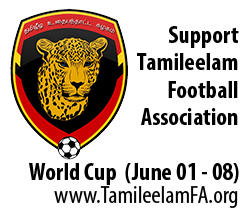Posts Tagged ‘Genocide’
Artist, Keerthana NagaratnamBy Editor - May 18th, 2015 |
 |
|
This week on Talent Tuesday, we present Keerthana Nagaratnam. She is the young artist behind Waves of Colour and uses art as a medium to express important topics to youth. Keerthana has played an active role in the Canadian Tamil Youth Alliance’s Thazhumbakam project. As part of the project, there have been a series of artwork viewings for its future establishment as a Tamil genocide memorial museum. We wish her the best on all her success! |
Chronicles of a Tamil Freshman – Part 8By Editor - May 18th, 2015 |
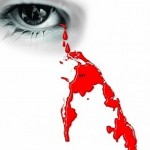 |
|
She knew she would never be the same person again. And for as long as she lived, she would never forget the terror, grief and anguish that resonated within her, as well as the Tamil community, as a result of the Tamil genocide. |
CycleBy Editor - May 10th, 2015 |
 |
|
Watch the song birds |
Enforced Disappearances of Tamils – “They tried to bury us. They didn’t know we were seeds”By Editor - February 21st, 2015 |
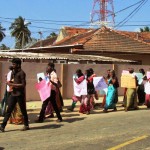 |
|
An enforced disappearance is defined as: “the arrest, detention, abduction or any other form of deprivation of liberty by agents of the State”iii. Sri Lanka has the second highest number of enforced disappearances in the world – the first being Iraq. The Sri Lankan state uses a policy of enforced disappearances against those who are critical of its genocide on the Eelam Tamil population. Sri Lankan state agents, such as the police and army, use a broad network of white vans and secret detention centres to abduct Tamils from their homes, on the street, in hospitals or checkpoints. Tamil journalists, activists and students are often targeted. Enforced disappearances are used as a way to send a message to the wider Tamil community, a warning to anyone who may have been considering speaking out against the state’s oppression. |
News Release: CTYA Welcomes NPC ResolutionBy Editor - February 12th, 2015 |
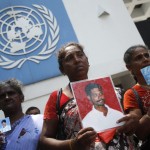 |
|
On February 10th, 2015, the Northern Provincial Council (NPC), with overwhelming support, passed a resolution calling for an international investigation into the ongoing genocide perpetrated by the Sri Lankan Government against Eelam Tamils. The Canadian Tamil Youth Alliance (CTYA) welcomes this resolution as a meaningful move towards justice and the freedom of the Eelam Tamil Nation. |
Why It Is GenocideBy Editor - January 8th, 2015 |
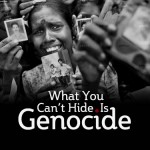 |
|
Written by: Priyanth Nallaratnam The Permanent People’s Tribunal last year concluded that what’s happening in Tamil Eelam is an ongoing genocide of Eelam Tamils. This is a historical landmark in the Tamil Eelam liberation struggle for couple of reasons: The independent panel of Jurists recognized the identity of Eelam Tamils in the island, recognized the… |
Our World Realities Differ : Remembering May 2009By Admin - May 18th, 2014 |
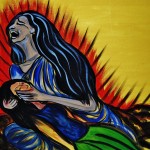 |
|
Written By: Mathusan Mahalingam Do a simple Google image search for ‘May’. What comes up? Beautiful flowers and symbols that all point to a month of happiness. Now search ‘May Massacre Tamils.’ See what comes up. This is why the reality of the month of May differs for Tamils. May no longer is a happy month, a month of happiness and flowers, but rather it a month of mourning, loss and sadness. What is May Massacre? Today marks the 5th year remembrance of May Massacre. 5 years ago during this time, the Sri-Lankan government engaged in a heightened program of genocide marked by murder, abductions, rape and denial of food and medicine to Tamils in Mullivaykal. This was a systematic program aimed at the physical destabilization and elimination of Tamils through murder and rape. Murdering able bodied men and boys is a way to prevent a community from fighting against genocide – it destabilizes the physical threat of a community to protect its rights, and that is why during May 2009, men were the primary targets when it came to killing. If you followed closely, men were targeted and ‘shipped’ off to different camps than women during May 2009, and this was a way of easily separating them and eliminating them. Women have been targeted in genocide in another way; the destruction and degradation of their bodies have been used as an instrument of genocide. Sri-Lanka used the rape of Tamil women as a tool of genocide. In many cultures, like the Tamil culture, women are the ones who bear the honor of their societies. Targeting their honor, and defiling a women’s body is a way in which perpetrators of genocide can terrorize a community. Raping women produces three outcomes perpetrators hope will happen. Firstly, it undermines the ability for the biological reproduction of a targeted group. If the perpetrators are of a different ethnicity, race, or tribe, then by raping the women of the targeted community, the biological reproduction of the targeted population is stilled. READ MORE INSIDE |
The Far Reaches of Systematic GenocideBy Admin - October 5th, 2013 |
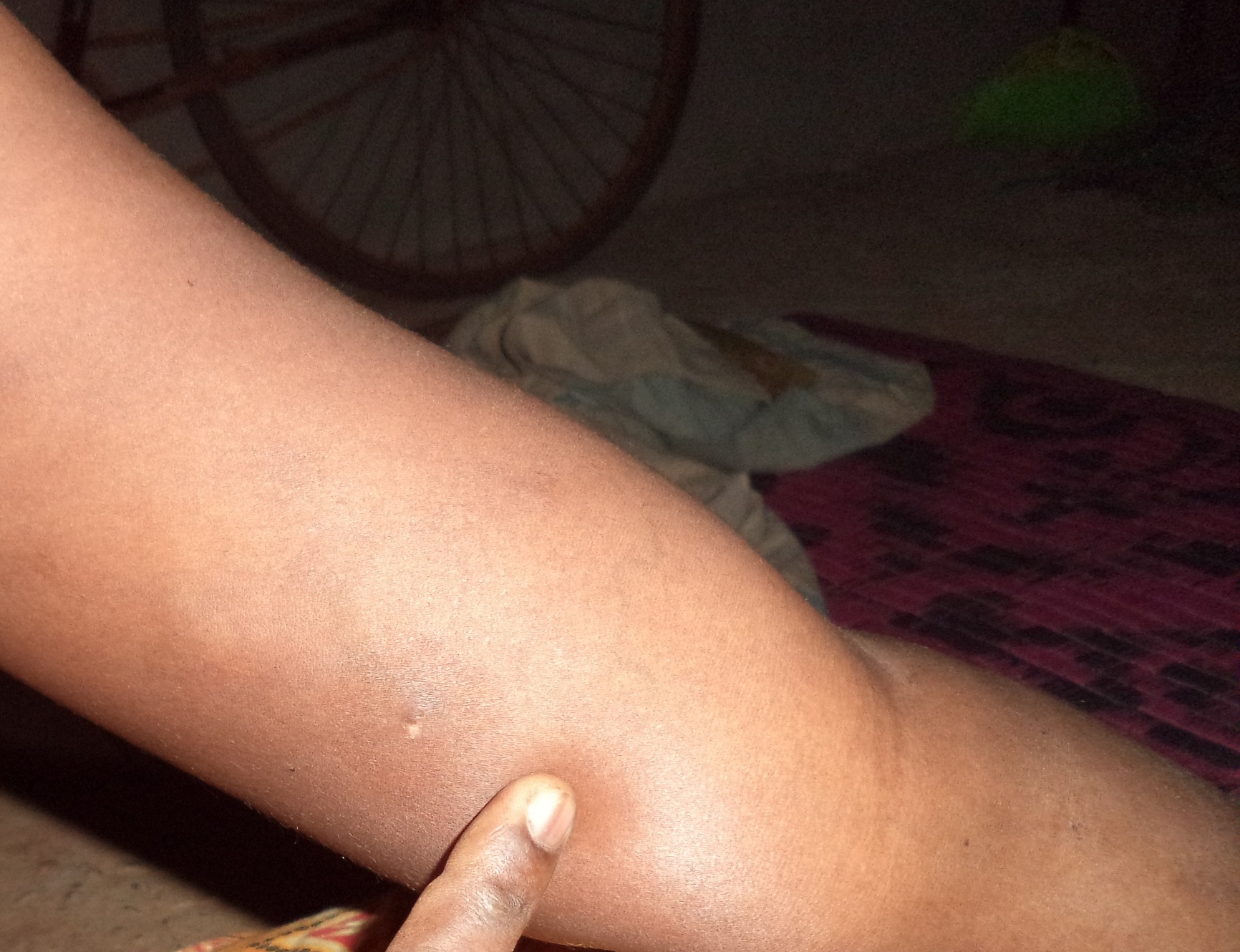 |
|
Written By: Athithan Kurukulasingam When one thinks about genocide, they look at the very root of the word. Genocide consists of the systematic eradication of a group within a region. Oftentimes, the group is the noticeable minority and face hardships far beyond the reaches of our comfortable way of life here in the west. There is a problem however, when you look at genocide in its most singular form, many of the other atrocities that are committed goes unnoticed. Within Sri Lanka, the Sri-Lankan Government would like the world to believe that the ‘war’ is over and that sense of normalcy is returning to the “nation”. However, it must be emphasized that this is far from the truth. It only takes a brief glance to notice the serious cases of genocide that are still taking place within this so called nation. In late August of 2013, in the Kilinochchi villages of Tamil Eelam, Tamil women were faced with coercive and underhanded tactics by Sinhalese doctors for ‘voluntary’ population control. At the outset, the terminology must be clarified. For purposes of this piece, the term “birth control,” also known as “family planning” and “planned parenthood” will be used in sync and refers to the voluntary planning and action by individuals to have the number of children they want, when and if they want them. In contrast “population control” is used to reiterate the belief that for the betterment of society in light of overpopulation, individuals should reduce the number of children they have (Robert, 1973). The women of the Kilinochchi villages were approached by hospital staff and volunteers and were informed that any woman with a child under the age of five should come to the hospital the following day to weigh their children and to receive a vaccination. Many of these women put their faith in the hands of an authority figure out of good faith. It must be noted that these women felt that they would get the best service from these big doctors from the city. Once there the problems started to arise. “Upon arrival at the hospital, the doctors and nurses used coercive language and manipulated medical information to convince the women to take Progestogen-only sub dermal implants (POSDIs), a long-term hormonal birth control inserted under the skin of a woman’s upper arm” (Social Architects, 2013). |
Jean apologizes for Canada’s role in RwandaBy Editor - April 21st, 2010 |
 |
|
Governor-General Michaëlle Jean formally apologized to Rwandans for Canada’s role as part of the international community that failed to act “soon enough” to prevent the 1994 genocide. Declaring the genocide was made possible by the “indifference and inaction of the international community,” Jean said “Canada acknowledges and takes responsibility as part of the international community for not having responded soon enough to what was happening here.” |
16th Year Remembrance of the Rwandan GenocideBy Editor - April 5th, 2010 |
 |
|
Today marks the 16th remembrance year of the Rwandan Genocide. Our thoughts are with those unfortunate victims of the Rwandan Genocide, and all those who have suffered under genocidal programs. |

